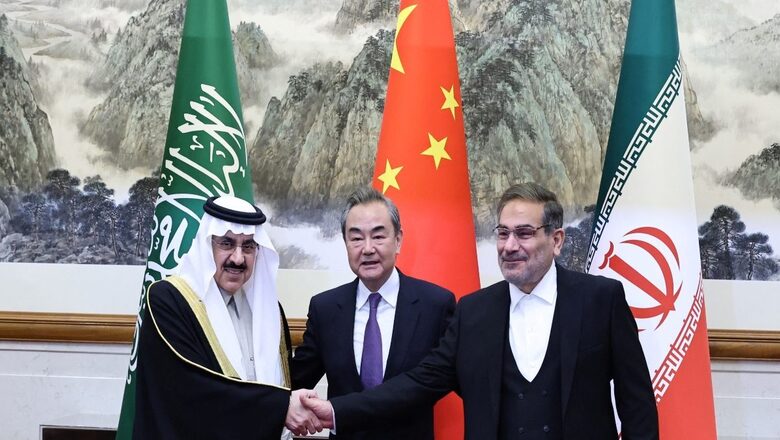
views
The Iran-Saudi Arabia peace agreement brokered by China is being seen by many analysts as a game-changing development in West Asia. While some expect a major realignment of forces taking place and a new order emerging in the region, others are convinced that a new, wannabe hegemon — China — is trying to occupy the space vacated by the old, distracted, somewhat confused hegemon — USA. While there is no denying that China playing peacemaker between the Saudis and Iranians is a significant development whose potential impact cannot be ignored or understated, it is important to also not overstate and over-hype its importance. West Asia is nothing if not an unending story of false dawns — remember the excitement over the US-Iran thaw nearly 10 years ago?
The agreement in and of itself is not earth shattering. It only restores bilateral diplomatic relations which had last been severed in 2016. The agreement also seeks to restore old security and economic cooperation agreements between the two countries. All of this is pretty standard stuff. What is, however, extraordinary is that both the protagonists have undertaken to respect the ‘sovereignty of states’ and not interfere in internal affairs of states. This formulation is interesting because it doesn’t talk of interfering in or respecting each other’s sovereignty but that of ‘states’. Presumably this alludes to ending the intervention by and proxy wars between Saudi Arabia and Iran in the various active theatres in the region — Yemen, Syria, Lebanon, Iraq. But seriously, does anyone really believe that both sides will pull back and stay squeaky clean in adherence to this agreement by ending their involvement in these ‘small wars’?
The thing is that the rivalry, even enmity, between the Saudis and Iranians is as old as Islam itself. It is not just a sectarian issue, but also a civilisational and cultural battle. It is an ideological struggle for the control of Islam which is manifested in the geo-political power games in the region and beyond. On top of all this, it is becoming a tussle between the transformational efforts of the Saudi leadership to embrace a radically different worldview from the one that the antediluvian Ayatollahs of Iran represent. This 1,500-year-old rivalry isn’t going to go away just because there is a new wannabe sheriff in town. In fact, even when the US was the undisputed hegemon and had excellent relations with both Saudi Arabia and pre-Islamic revolution Iran, relations between the two ebbed and flowed and were often testy.
Therefore, anyone who thinks that with China coming in things will be radically different has another thought coming. And yet, there are political, security and diplomatic compulsions and calculations that have paved the way for the recent thaw. But these are more tactical rather than strategic in nature and will at best lead to an uneasy accommodation of each other for as long as it lasts. Of course, for now there will be all sorts of hifalutin statements of peace, cooperation, investment and brotherhood from all sides, which each side will take with a pinch of salt.
At the strategic level, the agreement does add to China’s diplomatic heft and raises its profile beyond that of being an economic giant and a burgeoning military power. China has certainly demonstrated its ability to intercede and bridge differences between countries’ daggers drawn with each other. But in the process, it could well end up expanding its equities with both sides if it cannot sustain the thaw or ensure that the two sides stick to their side of the bargain. For now, however, China will be entitled to bask in the glory of what many see as a diplomatic coup. But to extrapolate from this achievement and imagine that the Chinese are the new big daddies of the region and have replaced the US would be a mistake.
The only reason why the Chinese were able to play the role they did was because of shoddy US diplomacy which seemed to leave a sort of vacuum in the region. There has been a growing sense that the US is just not as focused on the region as it used to be in the past. The reason for that, some believe, is the US no longer sees West Asia as being central to its interests in the way it was a couple of decades ago. The American focus has shifted to the contestation with China in the Indo-Pacific and has further been diverted by the Ukraine war. Add to this the fact that the US has virtually no equity with Iran which it could have used to play an honest broker.
Even with the Saudis, the Americans have messed up. The Biden administration has treated the Saudi Crown Prince Mohammad bin Salman (MbS) rather shabbily, especially after the Khashoggi affair. To reduce the entire relationship with Saudis to just this one rather unsavoury incident (it isn’t as if other countries, including the US and its European allies haven’t ever indulged in such actions, only the Saudis were very clumsy and were caught out) doesn’t make any sense. If anything, the Americans should be doubling down in support of MbS who is attempting changes that could transform the face and fate of West Asia in a way that was unimaginable a few years back. But with wokeism guiding US foreign policy, instead of encouraging and supporting MbS, the Americans seem more interested in shunning him and treating him as a pariah. Ironically, when Saudi Arabia was a medieval monarchy, the US was glad to look the other way to the non-existence of civil rights, women rights and human rights; now when Saudi Arabia is making a radical departure from the past and opening up, the Americans are hell bent on scolding and shaming the Saudi ruling dispensation. Frankly, compared to some of the really horrible leaders that the US has had no compunctions in dealing with, MbS is an angel.
Despite the lack of warmth in the relationship between the Saudis and the Americans, the latter were kept in the loop on what was happening with Iran. The Saudis have quite smartly used the space available to try and maximise their advantage. At one level, by normalising relations with Iran, they hope to disarm Iran and the threat that it poses with its aggressive and interventionist diplomacy, particularly in places where Saudis have vital security interests. This buys time and space for Saudis to do their own thing, domestically as well as in the defence and diplomatic field. At another level, the Saudis hope to use the US and China rivalry to their advantage. They think that this move will focus US attention on keeping close to the Saudis and giving them the security guarantees that they are seeking from the Americans. What is more, the reluctance of the Americans to sell some of the weapon systems to Saudis and also hector and preach to the Saudis could be tempered by the new developments and realities.
For their part, the Iranians also get some space. Beleaguered by the unending protests by women, reeling under the US-led Western sanctions, and with the economy in a crisis, the Iranians needed to claw out of their isolation. With normalisation of relations with Saudis, other Arab states like UAE will also follow. But perhaps compared to the benefits that the Saudis get, the advantages for Iran are somewhat limited. The sanctions imposed on Iran are not going away. It is unlikely that the Saudis or Emirates will bust these sanctions. The Saudis are not going to turn the clock back on the channels they have opened up with Israel. Saudi allies like UAE are also unlikely to reverse the diplomatic normalisation with Israel. New groupings like the I2U2 are not going away anywhere. The really interesting thing to watch out for will be how much pressure will come on Iran’s nuclear programme from the Saudis. This is a critical issue for the Saudis, as it is for Iran. The bottom-line is that thaw will remain a work in progress and things could freeze over once again anytime.
Some analysts, especially the ones in Pakistan, are getting all excited and seeing the emergence of a new anti-Western bloc led by China. The Pakistani strategists (an oxymoron if ever there was one) believe that their dream of a PRICS (Pakistan-Russia-Iran-China-Saudi Arabia) alliance — the pun is entirely intended — could soon become a reality. This will allow Pakistan to once again extract geo-strategic rents from its geography. The icing on the cake will be that India will get isolated in the region. But this is yet another one of the great Pakistani delusions that have ruined that country.
From the Indian perspective, there is certainly some discomfort to see the Chinese play a big diplomatic role in a region in which India has vital security and economic interests. But India’s relationship with all the major players in the region is robust and is only deepening and becoming stronger. In fact, in some ways, the Saudi-Iran thaw makes the diplomatic tight-rope walking a lot easier for India. While India needs to watch very carefully the Chinese intrusions and influence in the region, it is important to not get overawed by the diplomatic coup pulled off by the Chinese.
The writer is Senior Fellow, Observer Research Foundation. Views expressed are personal.
Read all the Latest Opinions here




















Comments
0 comment